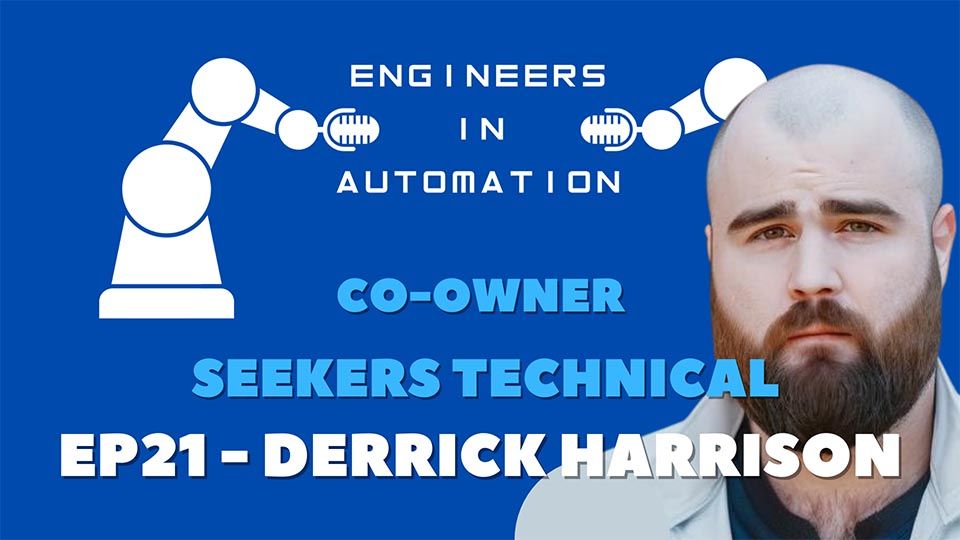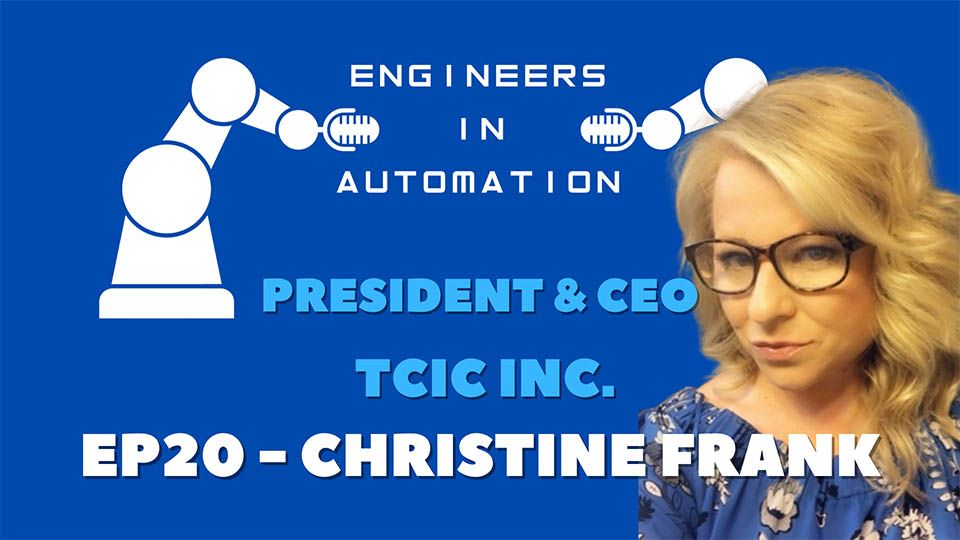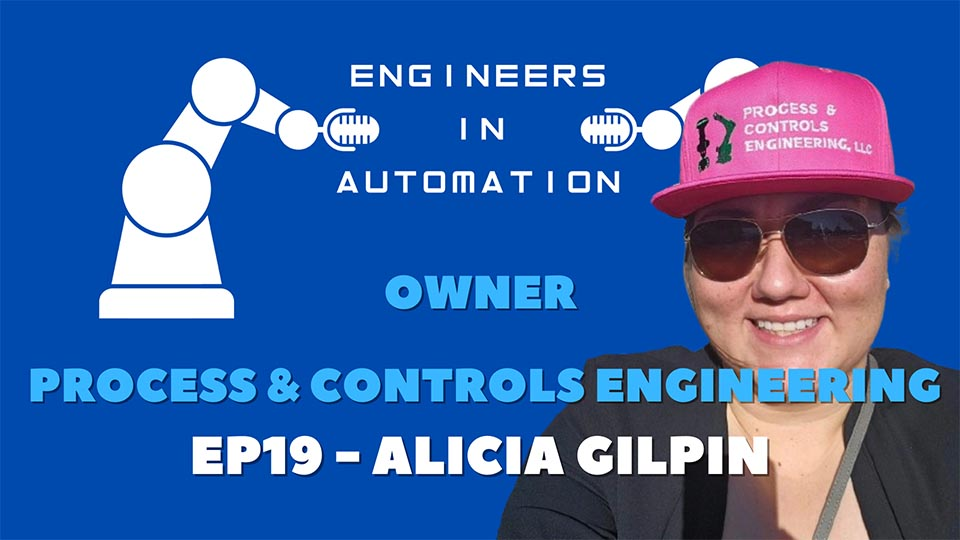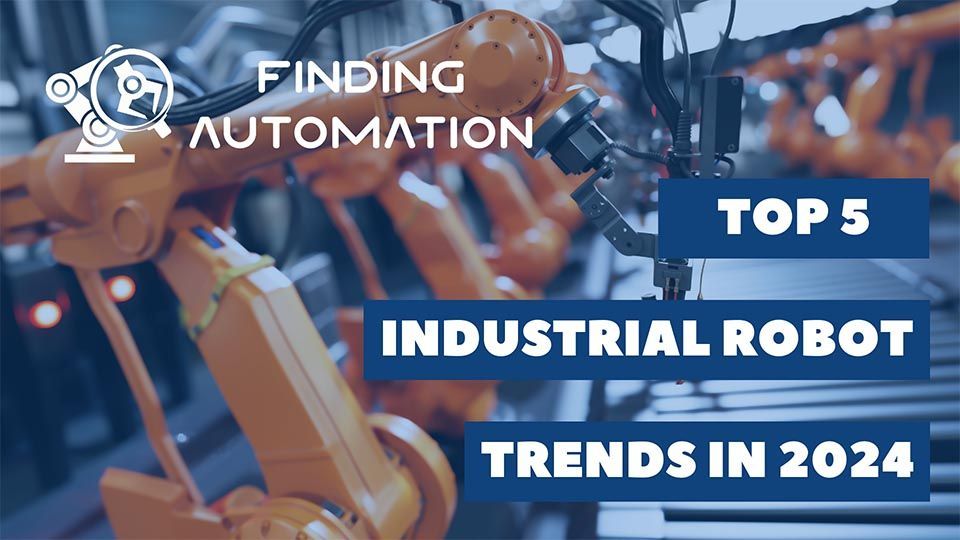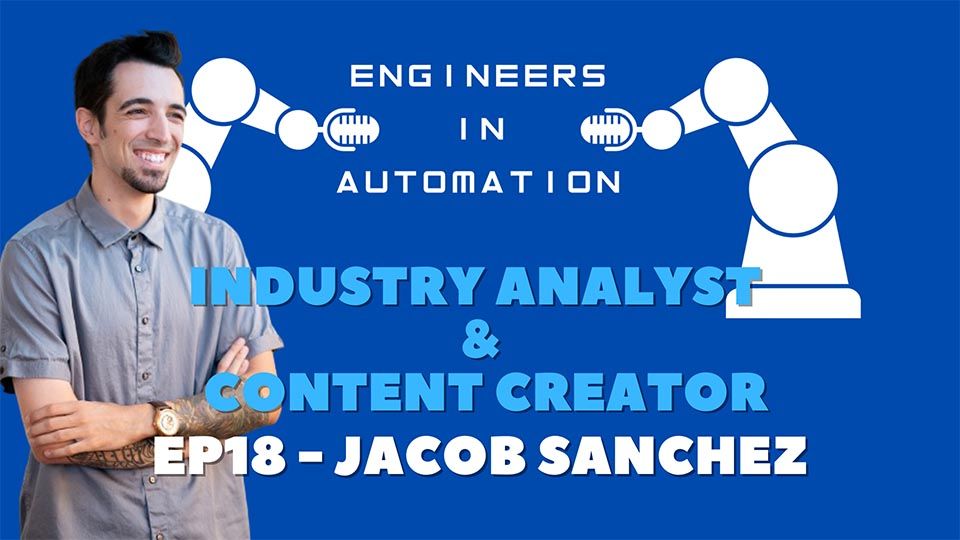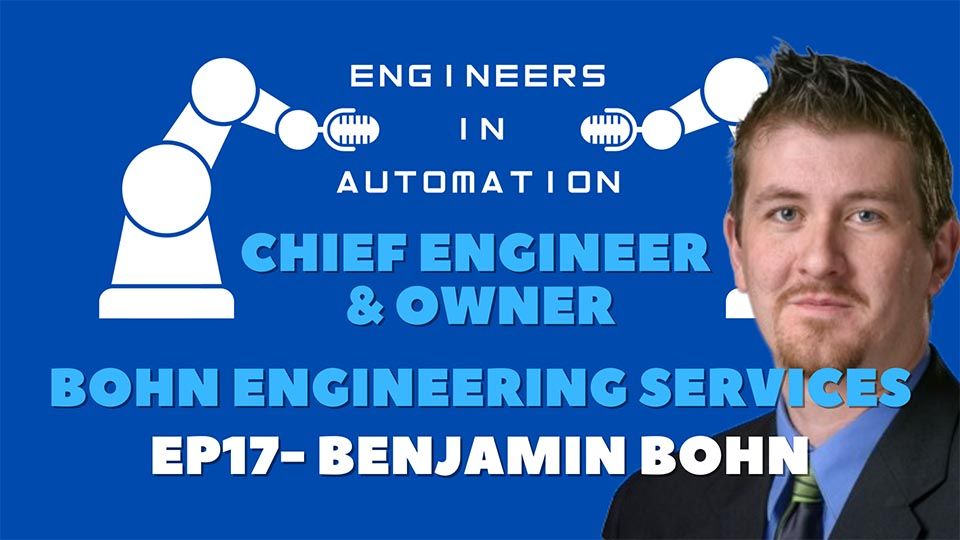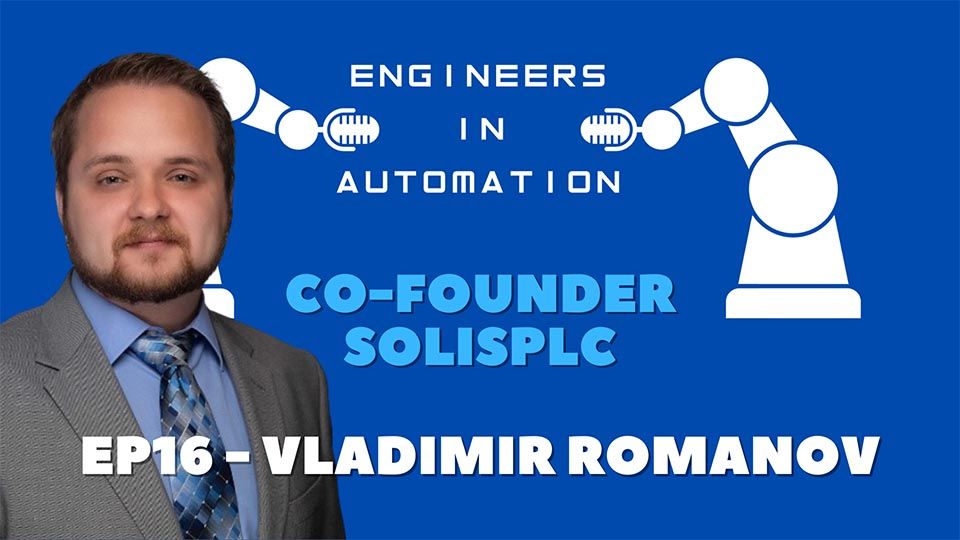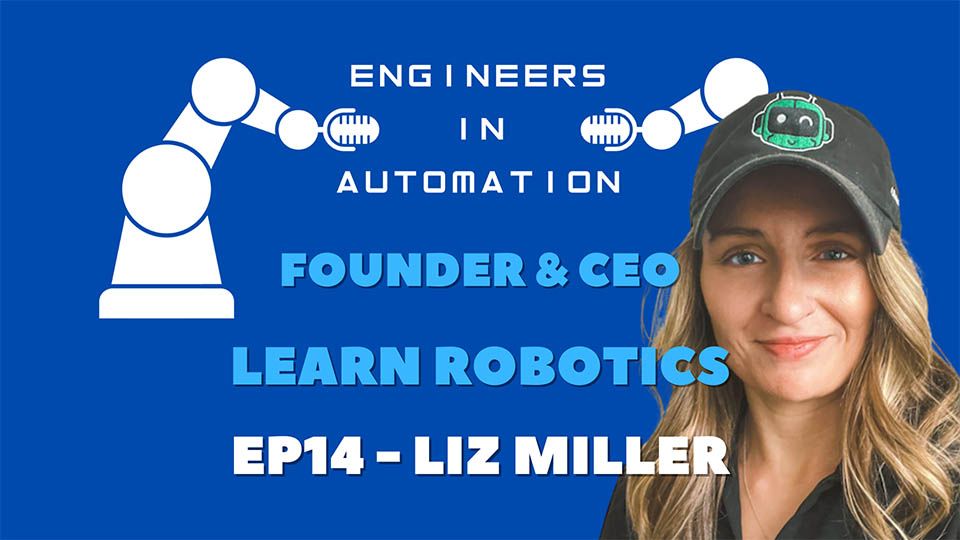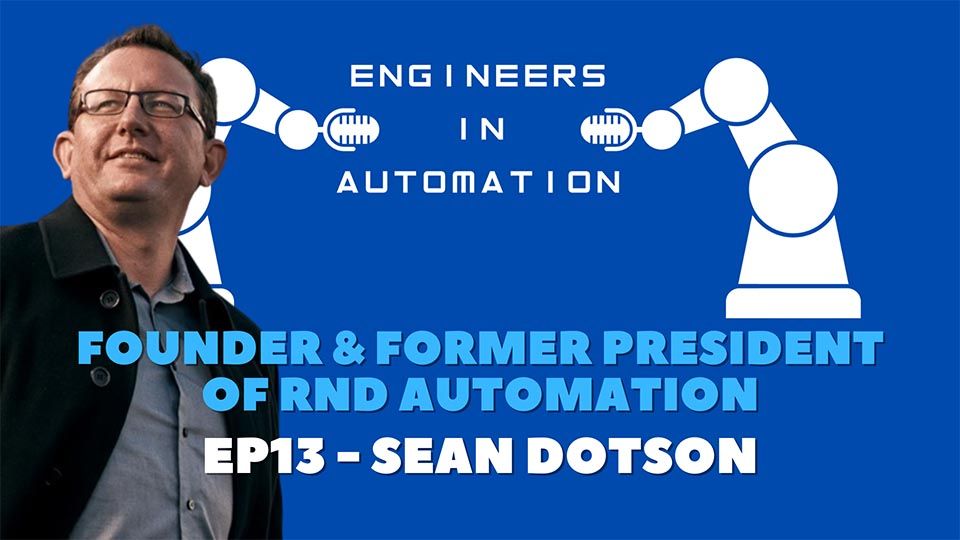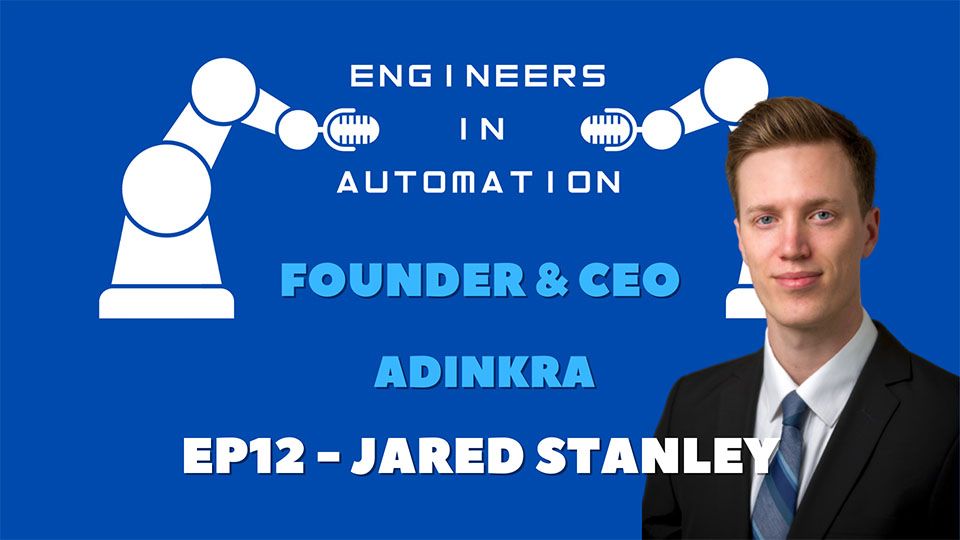Brennen Dugger | Blue Collar Automation
Engineers in Automation - Brennen Dugger Episode 15
In this episode, we talk with Brennen Dugger, the President of Blue Collar Automation. We talk about why he started his company, how he finds new clients, and his goals for 2024. We also discussed how he plans to improve his work-life balance by developing better project management processes.
WATCH THIS ENGINEERS IN AUTOMATION EPISODE:
Engineers In Automation | Brennen Dugger
Keegan Dillon – Host (KD): Hi, I’m Keegan, and I’m your host of Engineers in Automation. On today's episode, we're going to be talking with Brennan Duggar. He's the president of Blue Collar Automation. We're going to talk a little bit about why he started his company. We're going to talk about quickly growing his business. We're also going to touch base on some of the likes about the automation industry that he has. Now, let's go talk automation!
KD: All right, and welcome to today's episode. Today I've got Brennan Duggar. He's the president of Blue Collar Automation. Brennan, welcome to today's show.
Brennen Dugger – Guest (BD): Yeah, thanks for having me, Keegan.
Brennen Dugger Introduction
KD: Yeah, of course. And let's go ahead and jump right into it. Can you give everybody a little bit of background about yourself?
BD: Yeah, so I'm an automation engineer. We're based out of Memphis, Tennessee, and we started Blue Collar Automation. Actually, two years ago, yesterday.
KD: Wow, congratulations, and happy birthday then.
BD: I didn't even realize that, actually, that today's a 12. Yeah. So, two years ago, I couldn't find a job in Memphis that I liked. And so I started up Blue Collar Automation and I've been traveling the country ever since. I mean, I'm at good old, where am I at right now? Constantine, Michigan.
Brennen Dugger’s Automation Background
KD: Okay. Yeah. So you're in my home state. So welcome. And then let's just touch a little bit on your background. How did you get into the automation industry? It sounds like your backgrounds in controls, I'm guessing.
BD: Yeah, yeah, backgrounds and controls and PLC programming. So, I got into it by kind of being forced by my dad. When I was originally enrolling in college, I wanted to be an electrical engineer. Well, backing up, I wanted to be a DNR officer when I first went to college, and then I realized it was a tough field to get into. And so, I enrolled in electrical engineering because my dad is an electrician. So he was always just saying, like, how he wished he could have went beyond the electrician portion and understood what these guys are doing. So I went double E. Miserable, hated it. So bored. I dropped out of college. And I apprenticed as an electrician at my dad's factory.
And that's when I ended up meeting a couple of people who did PLC programming. And he's like, “Yeah, that's what I meant. That's what I wanted you to do.” And I was like, “Well, wrong, wrong bachelor's degree, because that really sucked.” And so, I reached out to the university, and I enrolled like two weeks late into the Electrical Engineering Technology program at Purdue, Indianapolis IUPUI. And I just had a good professor named Joe Davis, who kind of pointed me in the direction and helped me kind of find my path. And once I took my first PLC class, it was over. That's what I wanted to do.
Work After College
KD: Yeah, good. Good for you. And then and then, it sounds like you worked a little bit. For a company or for maybe a few companies before jumping on and starting your own company here two years ago?
BD: Yeah, yeah. So, in college, I took five years to graduate because I missed a class. It was only offered in the fall. So, I was working at a process company called ACE Technologies in Indianapolis. I worked there full-time, my whole senior year as an engineer, so I was doing projects for them. And then I went to a career fair, and I met the guys at JR Automation. And the process stuff kind of bored me. So I was like, well, let's see what, let's see if I can get a job here and moved to Michigan and see what happens. And so I ended up getting a job at JR. Up in Michigan, and I worked there for two years, and then got homesick, and moved back to Indianapolis to work for Rockwell. And then my girlfriend got a PhD position in Memphis. So, I moved down there. worked for a company that built package sorters for FedEx, got tired of traveling, then I worked for manufacturer got tired of working there. And then I started this.
The Catalyst To Start A Company
KD: Good for you and congratulations. And I guess let me ask this. What was the catalyst that made you decide, “Hey, I want to be a business owner and start my own company?”
BD: Yeah, funny enough. I actually never wanted to own a business. I would have argued with you three years ago that running a business like this is stupid. And if you catch me on the right day, I might still tell you, it's stupid. But the catalyst was my good friend and mechanical engineer. Now Tim Hayden, he owns Hayden Automation. And he was a lead design engineer at JR for like six years. And he was the one that kept telling me it was a good idea. Good idea. Good idea. Good idea. I was like “Nah, nah, nah.” And then once I started to dislike my plant job, just due to the environment. I started talking to him more and I'm like, you know, this might be a good idea. And then we just kind of had a deal where I was gonna go out on my own. He was gonna do all my mechanical design. I was gonna do all his controls and He kind of talked me into it.
But also in Memphis, there's not a whole lot of engineering companies to work at, there's not a lot of manufacturing there. And so there's one really big one there. But what they did didn't really interest me that much. And so I kind of just wanted the freedom to design my own projects. Because as a controls engineer, you know, once you're a Yes, man and a company, you get handed all the fires. And I just knew that if I went work for another big company, I would do good on one or two projects, and I'd be on the road forever. And so I just decided to call up my old employer, see if they needed a contractor. And they did. And I went worked for them for a month.
And that's kind of what started it was cool. I saw the there was an opportunity to actually do it. Because right, that's the hardest part is when you started how you gonna make money you got it's it is not as easy to find jobs as I thought. And so it took a lot of kind of figuring out how to network and, and reaching out to old, old connections to make it work. But I don't really know what the full catalyst was, you know, I think I was just looking for a job that interests me.
KD: Yeah. Yeah. And it definitely, I'm sure, you know, as I know, as well, being a business owner, it keeps you on your toes, and every day is definitely interesting.
BD: It's it's definitely given me the ability to own all of my own problems. You know, there's no finger pointing when you own company, which I never really did before. But it's a it's a hard kick in the stomach when you make mistakes, and you own the company because guess who has to fix them? You!
Blue Collar Automation Business Focus
KD: Yeah, exactly. Let me ask this. It sounds like your backgrounds, obviously controls, is that your main focus? PLC programming?
BD: No. So we in the beginning, it was yes. But now we're building we've been building full machines for over a year now. So, my main focus is a little bit everything but mostly PLC programming, electrical design, and robot programming, you know, as we got over here, you can kind of see this panel in the back not to 70 to two-inch panel controlling to KUKA robots, to vision systems to HMI’s. So we're kind of getting into all of it.
But I'd say the core is we're trying to do small robotic cells. And we do a lot of upgrades and retrofits, which I've been really enjoying recently. We do a lot of like hydraulic press upgrades where we take old relay panels, put a PLC and HMI and make it smart. So it's kind of a full gambit of everything, but it just depends on the project, you know like some projects don't even have a PLC we got an Epson robot project the shop right now no PLC, we did a robot cell with UR with no PLC. So it's kind of all over the place.
When I first started out, I wanted to do what I did at Rockwell and upgrade PLCs. Because that's all I did when I was at Rockwell. But I've only done one PLC upgrade in two years.
KD: So it's funny how the self-employment route will take you down a different path maybe than what you originally thought.
BD: I never would have thought I'd be doing wanting wanting to do and doing robotic cells just because I was so good at upgrading PLCs like working for Rockwell. We just we had customers, that's all we did upgrade upgrade, upgrade upgrade. So me coming in. I'm like, that's what I'm gonna do.
The Location Of Blue Collar Automation
KD: Cool. And let me ask you kind of you kind of mentioned it sounds like you do have a facility, a shop?
BD: Yeah, we have a shop in Memphis, Tennessee. So we've got like, a full shop and offices. That's me. And I have one controls engineer full-time. I've got a contract controls engineer in Detroit.
KD: That was gonna be my next question, how many employees do you have?
BD: So yeah, just me and one other guy. And then Tim, my mechanical guy and some controls, guys.
Finding New Clients
KD: Cool. Cool. And you kind of already mentioned it is, you know, finding new clients. Have you found you know, marketing through social media? Has that helped you a lot? Also, or is it just word of mouth? Is that how you're getting a lot of a lot of new business?
BD: Mostly word of mouth and previous employees? You know, I found early on because I had that first month contract. And then I ran out of work in January of 22. And that was really where I was struggling to find. I could find a lot of small business, you know, “hey, go here for two days,” “Go there for four days,” “Hey, can you come troubleshoot this?” But I was tired of doing that. So, I wanted to find my own projects. So I started just blasting LinkedIn. And if you've talked to Preston Hadley, you know, that doesn't work. People ignore your messages. I have one really good customer that found me on LinkedIn. I didn't reach out to them, they reached out to me.
But mainly, it's just been networking and word of mouth, you know, like we do. We'll do a project that a customer like we did a project for customer in Middle Tennessee. And then I reached out to the project manager, I was like, “Hey, there's a plant like two hours south of me can you get me in contact with the plant manager.” And so now we're doing three projects in there right now. So it's kind of just once we do a successful project getting the word out because I haven't wanted to go full blown marketing yet just because I only have one other guy and our facilities only 2000 square feet. So it's like if I go when I could project of this size, you know this is taking up 4000 square feet in one of our customers facilities that we work with. And I could never fit a project like this So far, we haven't really had the need to do that yet.
Work-Life Balance As A Business Owner
KD: Yeah. Interesting. And, you know, it sounds like you're kind of on the road a lot. How do you, you know, balance work life balance, you know, living in Memphis there and traveling on the road and being a business owner calls don't stop work doesn't stop. How do you balance that yourself?
BD: Well, this year, I've done a very terrible job of doing that I quoted a lot of work in January, and I didn't plan it out very well. And they all hit at the same time. So I've been just working nonstop for six months doing all this work. So after this project is when I'm really gonna get my project management down pat, and understand that you could win all the work, and you might not, and I need to plan accordingly. So, I kind of I'm learning as I go. I guess is is what I'll say I have not had a good work-life balance. It's just been a work balance at this point. But it's my own fault. And it's due to rapid growth.
So it's good problems to have. But I put I put too short of timelines in between projects. And so when one goes over, and then I got to just go from next to next to next to next. So that won't, that won't happen again, though.
Being A Business Owner
KD: Yeah, yeah. So it sounds like you, you almost need, you know, a good way to balance all these potential incoming projects with timelines and scheduling. And I'm sure you I'm sure you'll be able to figure that out. You know, what are the what are the some of the things that you'd love? Because obviously, these last two years have been probably a whirlwind for you. And especially it sounds like last six months, you know, what's it been like being a business owner?
BD: Oh, man, there's a lot of ups and downs, dude, there's, there's days where I love it days where I asked myself, Why am I doing this to myself, but when you boil it down, it's all just self-inflicted problems. And there's, you know, this is kind of the cycle of running a business like this is, in the beginning, you're struggling for work, right? So then you want to quit everything and be a yes, man. But then when you went all the work, now you're struggling to manage it. And so I did really good on my own by myself, just doing jobs here and there. I managed it great. I had no problems. I just did one project at a time. But when you went through four projects at a time, you're managing three contractors, and you're traveling like I do, it gets tough, but I'm kind of glad I grew this fast because I was able to learn these hard lessons and know that I will not make the same mistakes down the road.
And the company I'm working for up here, he does a really good job of managing his projects and just doing, you know, one after another. And so it's all a learning process. But when you talk as much as I do, and network as much as I do, I should have known that I would have won this much work. But it's hard to foresee when you're hungry, you know?
Goals of Blue Collar Automation
KD: Yeah. Well, and you kind of mentioned it there. When you're talking about, you know, business goals. Do you have? Do you have some set goals that for this year that you've wanted to reach? How are you doing there? Have you set any 2024 goals? Have you laid anything out? From that perspective, “Hey, I want to win X amount of projects or bring in X amount of revenue?” Have you gone through any of that stuff? And if so, how are you doing this year and or potentially for next?
BD: Yeah, so my goal this year was to bring on one full-time engineer and win some of our own turnkey projects because we do a lot of work, where they'll just contract us to do only the PLC programming or the PLC and the electrical design in the install. And so my goal this year was just to win our own robotic cells, or our own turnkey projects. And I wanted to do five this year, I think we've done seven already. So I first asked that, and then I have an employee, he, he's embedded in a customer three days a week, and then he does work at the shop the other two days a week.
But I'd say for 2024, I just want a better work-life balance. And so we're going to try to continue to do the same amount of projects, kind of the same revenue, per se. But my goal for 24 is to win the same amount of work, but timing out better. You know, because the problem is, is when you mentioned dates to customers in the preliminary meetings, they want to hold you to those. And so I tried to do that. And we have, for the most part, it's just been at the expense of median gone all the time. So 2024, My goals are to organize the business a little better to where we're more streamlined at the shop, because I want all these projects and got the shop at the same time. So I haven't really had time to set up all of our parts bins and set up our panel area and then you know, do all the necessary things to you're looking for tools everywhere, and I'm looking for parts and so it kind of all happened at once.
So 2024 goal is to get organized. And space these I hired a project manager part-time. Now that's right. And so the goal is to pass him to the projects and him map them out so that when we go to customers, you know, “Hey, I can't start this till November,” type of deal instead of “Yeah, we'll start on that right away.” Because it always takes longer than you think it's gonna take but you know, you don't foresee the hiccups in installs and to get to the install, and when that pushes other projects, it just makes everything else suck. Yeah, so we're getting there.
Brennen’s Automation Likes
KD: Yeah. So is there any major likes? I mean, obviously, you know, you've been in this industry now for some time, you've had a bunch of different jobs, you've started a business, what are some of your major likes that you enjoy about the industry?
BD: I enjoy the people. One thing I really like is working with other engineers that we contract who really know what they're doing and make, make it easy to work with, you know, because I've had a whole gambit of contractors that, you know, you name it, it's happened to me. And so I really enjoy working with the people who are passionate about it, like I mentioned, Tim Hayden earlier, you know, he is the best machine designer that I've ever met. And the quality in the care that he puts into his work makes my life easier, because he foresees a lot of things, and then we work together. So it's like he takes ownership of his portion of the projects. He's not just punching a clock and doing the minimum.
And so I enjoy working with people like that. I think the most because, at the end of the day, it's all the same, where whatever project you're doing at the base level, you're designing, you're programming you're installing. And so I really enjoy the process of working with people and meeting new people wherever I'm going.
But I also really like seeing a project you design come to life, like to see all these panels and stuff back here that we've designed going in the field for a large large project is pretty cool.
KD: Yeah, yeah, I'm with you. And I've talked with several people that do say the same thing, where it's just, you love to see something go from nothing to something. Rather, it's, you know, building it yourself and or coming in there doing a rehab and, you know, getting it upgraded to the latest version, or doing a full install, right, that's what a lot of people seem to like, and I'm with you as well, I really enjoy the camaraderie of working with people in the shop, and, you know, working together and building something together, and then, you know, running multiple parts through it in the beginning, where it's 2, 3,4, and then by the end of the week, now you run 100. And then next week, you gotta run 1000. I think I just love the camaraderie there. You know, setting a goal and going after it.
BD: Yes, we did a hydraulic press in Pennsylvania in March. And to see it go from concept to design to like, running perfect parts off the bat was so cool. Like, it was such a good feeling like to see this brand new, nice panel go in front of this nasty old, you know, 60-year-old relay panel was really cool to see, like, you know, because like when we were in that first part, I was nervous, because I had never programmed to press, you know, I've worked in plastics like that before. And so it came out, and it was perfect. And I was like, “Holy crap, this is pretty cool.”
Because it was like the first time you know, that I had got to run the code once, and it just worked. I mean, we had to make tweaks and stuff here and there because I wasn’t familiar with hydraulics. Don't get me wrong. We broke the press the week before, but it was due to the hydraulics and the controls, but that's a different story.
But ya know, it's it's cool, man. Because at the end of the day, no matter how much you love something, it's gonna become work, right? Like, it's not gonna. It's not always going to be fun. You know, we're in Missouri a couple of weeks ago, me my employee, and one of my buddies that I contracted who's between jobs. And you know, we've worked 14-hour days at this factory, and then go back to the Airbnb and hang out and stuff. And it's like, when you're around good people makes it easier.
Contact Blue Collar Automation
KD: Yeah. Yep. Absolutely. And then before we wrap up, Brennan, where can people reach out to you? How can they get ahold of you? How can they reach out to Blue collar Automation?
BD: Yeah, the easiest thing would be LinkedIn. You can get my email off of there or our website, bluecollarautomation.com. There's an email and a phone number on there. And so that's pretty much the two places that I used to contact.
KD: Okay, cool. And then we'll put a link in the description. So go down below, click the link, and follow him. So, if you guys enjoyed today's episode, please give us a like, comment, share, and don't forget to subscribe, and we hope that you join us here next time on Engineers in Automation. Thank you.
BD: Yeah, thank you!
If you enjoyed that podcast episode, get more information below!
CONTACT OUR GUEST:
Connect with Brennen Dugger on LinkedIn.
Learn more about service from Blue Collar Automation.
SPECIAL THANKS TO OUR SPONSOR:
JOINER Services sponsored this episode. A platform where self-employed engineering contractors can showcase their own talents, and businesses have an opportunity to hire their services. If you want to learn more about JOINER Services and its engineering service platform for contract engineers, follow them on social media or sign-up on their website.
